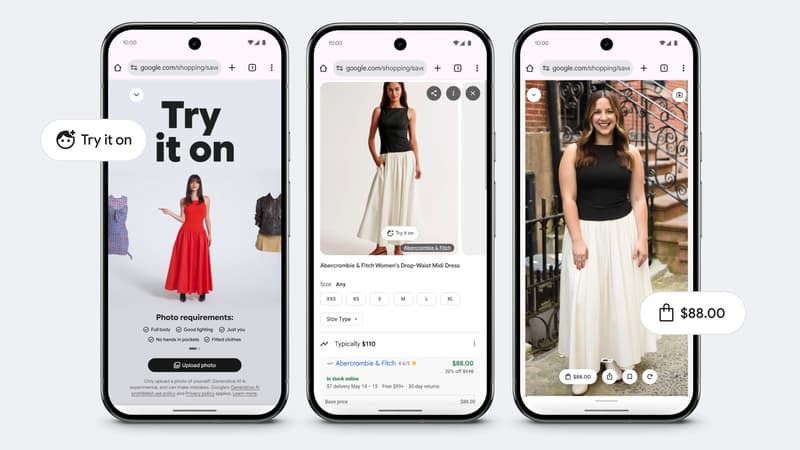The digital purchasing wizard who seeks the best prices alone, models for your taste, allows a virtual adjustment and can even, if authorized, liquidate purchases, is ready to enter our lives, driven by technological giants.
“This is the next stage of purchases,” considers Angelo Zino, an analyst at the CFRA research firm.
This revolution is possible thanks to the appearance of AI agents, who are no longer happy to answer questions or create content as first generation assistants, but now they can carry out a multitude of tasks at the request in everyday language.
A popular market among AI leaders
Last week, Google presented the purchase features of its reinforced search engine with artificial intelligence, AI mode, which “reduces search time for a few days to a few minutes,” according to Vidhya Srinivasan, in charge of advertising and trade within the group.
In the case of a garment, the AI can now create, from a photo, an image of the interested party that carries the costume or shirt that pleases it, respecting the measures, but also according to the material and the cut.
The Internet user can establish a maximum price and let Google pass online until you have seen a corresponding offer, even if you need several hours or days for that.
The customer can finish the purchase thanks to the Google Pay payment platform.
“They attack a bit on Amazon,” Avi Grengart, an analyst at the Techsponial firm, reacted for whom to buy “is a means to monetize” AI because it is likely that traffic and advertising income is probable.
At the end of April, OpenAI added a purchase functionality to Chatgpt, which responds to the demand for products of products, opinions of consumers and links to commercial sites.
According to the specialized TechCrunch site, the new Californian company will not receive percentage of commercial income generated by this channel. When asked about this issue, Google did not follow up.
“Buy in our place”
Another emerging actor, the perplexity, had submitted an offer for their subscribers they pay, which already allowed to go to the payment, understood, without leaving the request.
“The other platforms will have to enter it and will become the norm,” anticipates Angelo Zino.
Amazon launched its assistant, Rufus, then, at the beginning of April, the “buy me” mode that makes a purchase directly in a third place of a brand, outside the Amazon platform.
In mid -May, Walmart’s technological official Hari Vasudev spoke of the next arrival of an AI agent in his ecosystem, but explained that the brand also wanted to work with other platforms so that its attendees could recommend their products.
At the end of April, the two main actors in the world Payments, Visa and Mastercard, each revealed a new technical architecture that opens the way for direct purchase by a digital agent through their network.
Online purchase compilation for AI
“Distributors will now have to think about how to optimize” their positioning in the filter of an AI assistant, anticipates Elise Watson by Clarkston Consulting, and understand “what information will make a product more desirable for each digital agent.”
“These agents do not have to reveal what types of information prioritize, so merchants will be forced to touch and try the algorithm,” continues the analyst.
Angelo Zino does not expect an agitation in the hierarchy of electronic commerce. This new paradigm will benefit from Google, but also in goal, whose arrival in the world of purchase attendees anticipates.
“They probably have accumulated more information about consumers than any other,” said the analyst. “That is why for a long time they have been considered potential winners of this pivot towards AI.”
Some reluctance to provide
The advantage provided by customer knowledge again raises the question of the use of personal data.
Google will refine the consumer profile with your previous research, but ensures that the user has expressly authorized the use of additional information, such as emails or other applications.
For Elise Watson, this dimension should increase a minority part of customers, at least for some years.
In more general terms, if technology is now at the level, “the legal, operational and ethical framework is not yet stabilized,” says Chris Jones, of the PSE consulting firm.
“Can we trust the machines to buy in our place?” He questions. “This question will depend on the next electronic commerce phase.”
Source: BFM TV


